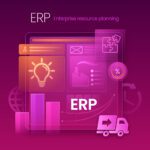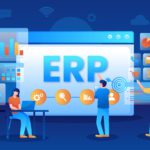In today’s fast-paced business environment, companies of all sizes face increasing pressure to streamline operations, improve productivity, and make smarter decisions faster. One powerful solution that has transformed how organizations operate worldwide is ERP software. But why exactly is ERP software required for your business? What benefits can it bring, and how can you ensure you choose the right system? This article dives deep into the critical reasons your business needs ERP software, how it can optimize your processes, and why it is an indispensable tool in modern business management.
What is ERP Software?
ERP (Enterprise Resource Planning) software is an integrated suite of applications designed to manage core business processes in real-time. These processes include finance, human resources, supply chain, manufacturing, sales, procurement, and more. Instead of using separate standalone systems that operate in silos, ERP consolidates data and workflows into a single unified platform, ensuring smooth communication across departments.
By connecting various business functions under one roof, ERP software provides a centralized source of truth, allowing better visibility, control, and decision-making.
The Evolution of ERP Systems
ERP systems have evolved tremendously since their origins in the 1960s as inventory management software. Over the decades, they expanded to cover broader business functions, incorporating automation, data analytics, cloud computing, and AI. Modern ERP solutions now come with customizable modules and integrations, making them flexible and scalable to suit any industry or business size.
Today’s ERP platforms—like SAP, Oracle NetSuite, Microsoft Dynamics 365, and Odoo—offer cloud-based deployments that reduce IT costs and improve accessibility. This evolution has made ERP software more affordable and accessible for small and medium-sized businesses (SMBs), not just large enterprises.
Why Your Business Needs ERP Software
1. Centralized Data Management for Better Accuracy
One of the biggest challenges businesses face is fragmented data scattered across multiple systems. This fragmentation leads to data duplication, errors, and inconsistencies, which can cause poor decisions and operational delays.
ERP software centralizes all business data into one database, improving data accuracy and reducing redundancies. When your sales team updates a customer order, your finance department automatically sees the changes without manual intervention, ensuring everyone works with the latest information.
2. Streamlined Business Processes and Improved Efficiency
Manual processes or disconnected systems often cause bottlenecks and inefficiencies. ERP automates routine tasks such as order processing, invoicing, payroll, and inventory management, freeing up your employees to focus on more strategic activities.
By integrating workflows across departments, ERP reduces delays and errors, helping your business operate smoothly and efficiently.
3. Real-Time Reporting and Business Intelligence
A significant advantage of ERP is its ability to provide real-time insights. With dashboards and customizable reports, decision-makers get instant access to KPIs, financial data, and operational metrics. This transparency allows businesses to spot trends, identify problems early, and capitalize on new opportunities.
Having reliable analytics helps your business stay agile in a competitive marketplace.
4. Enhanced Customer Service
ERP software helps improve customer satisfaction by enabling faster order fulfillment, better inventory control, and accurate delivery tracking. Sales and customer service teams can access complete customer histories, order statuses, and product availability in one place.
This comprehensive visibility enables personalized service and quicker response times, which are essential for building long-term customer loyalty.
5. Regulatory Compliance and Risk Management
Compliance with industry standards and government regulations is crucial for every business. ERP systems help automate compliance reporting, maintain audit trails, and enforce data security policies.
By minimizing risks related to financial reporting, tax regulations, and data breaches, ERP protects your business and ensures peace of mind.
6. Scalability and Flexibility for Growth
As your business expands, managing increasing volumes of data and transactions becomes complex. ERP software is designed to grow with your company by adding new modules and users as needed.
Whether you’re opening new locations, entering new markets, or launching new products, ERP systems provide the flexibility and scalability your business requires.
Key Features of ERP Software That Drive Business Success
To fully understand why ERP software is essential, let’s explore some of its key features:
Integrated Financial Management
ERP unifies general ledger, accounts payable, accounts receivable, budgeting, and financial reporting in one system. This integration eliminates manual reconciliations and provides real-time visibility into your company’s financial health.
Supply Chain and Inventory Management
Real-time tracking of inventory levels, automated reordering, supplier management, and demand forecasting are critical ERP functions that optimize supply chain performance and reduce carrying costs.
Human Resource Management
From recruitment and onboarding to payroll and performance tracking, ERP helps streamline HR processes and maintain employee data securely.
Customer Relationship Management (CRM)
Some ERP systems include CRM modules that manage sales pipelines, marketing campaigns, customer support, and service history to boost customer retention and revenue.
Manufacturing and Production Planning
For manufacturing businesses, ERP handles production scheduling, quality control, and resource allocation, improving efficiency and reducing waste.
How to Choose the Right ERP Software for Your Business
Selecting an ERP solution can be overwhelming given the variety of options and features available. Here are some crucial factors to consider:
Understand Your Business Needs
Identify which business processes you want to improve and what challenges you currently face. Prioritize the modules you require most urgently.
Consider Industry-Specific Solutions
Many ERP vendors offer specialized solutions tailored to industries such as retail, manufacturing, healthcare, or construction. These often come pre-configured with relevant features and compliance tools.
Cloud vs On-Premise ERP
Cloud-based ERP offers lower upfront costs, easier scalability, and accessibility from anywhere. On-premise ERP provides more control and customization but requires higher initial investment and IT maintenance.
User-Friendliness and Training
The ERP system should be intuitive and easy to use. Look for vendors that provide comprehensive training and support to ensure smooth adoption by your team.
Integration and Customization
Check if the ERP can integrate with your existing software tools and whether it can be customized to fit your unique workflows.
The ROI of ERP Software: Is It Worth the Investment?
Implementing ERP software is a significant financial commitment, but the return on investment (ROI) can be substantial. Businesses typically realize benefits such as:
-
Reduced operational costs due to automation and process optimization
-
Improved cash flow through better financial management
-
Increased productivity from streamlined workflows
-
Better compliance avoiding fines and penalties
-
Faster decision-making enabled by real-time insights
-
Higher customer satisfaction driving repeat business
Several studies, including reports by Gartner and Forrester, confirm that ERP implementations can boost profitability and growth over time.
Common Challenges in ERP Implementation and How to Overcome Them
While ERP systems offer huge advantages, many projects face challenges that can delay or derail success. Being aware of these pitfalls can help you prepare better:
Resistance to Change
Employees may resist new systems due to fear or lack of familiarity. Involve your team early in the process, provide thorough training, and communicate benefits clearly.
Inadequate Planning
Poorly defined requirements or rushed implementations cause scope creep and budget overruns. Take time to plan thoroughly and set realistic timelines.
Data Migration Issues
Migrating data from old systems to ERP can be complex. Cleanse and validate your data before migration to avoid inaccuracies.
Insufficient Vendor Support
Choose a vendor with strong support and service to help resolve technical issues quickly.
ERP Trends to Watch in 2025 and Beyond
Staying informed about ERP innovations will keep your business ahead. Some emerging trends include:
-
Artificial Intelligence (AI) and Machine Learning: Automate complex tasks, enhance forecasting, and improve decision-making.
-
Internet of Things (IoT) Integration: Connect smart devices and sensors for real-time operational monitoring.
-
Advanced Analytics and Big Data: Gain deeper insights from massive datasets.
-
Mobile ERP: Access business data anytime, anywhere on smartphones and tablets.
-
Low-Code/No-Code Platforms: Simplify customization without heavy coding.
Conclusion: ERP Software Is No Longer Optional for Business Success
In an increasingly competitive marketplace, ERP software is a vital investment for any business aiming to optimize operations, enhance customer experience, and drive growth. By centralizing data, automating processes, and providing actionable insights, ERP empowers organizations to make smarter decisions faster and operate with agility.
Whether you run a startup, SMB, or large enterprise, the right ERP solution can transform your business efficiency and profitability. Take the time to assess your needs, choose the right system, and implement it thoughtfully. The payoff will be a robust foundation for sustained success in today’s dynamic business world.






